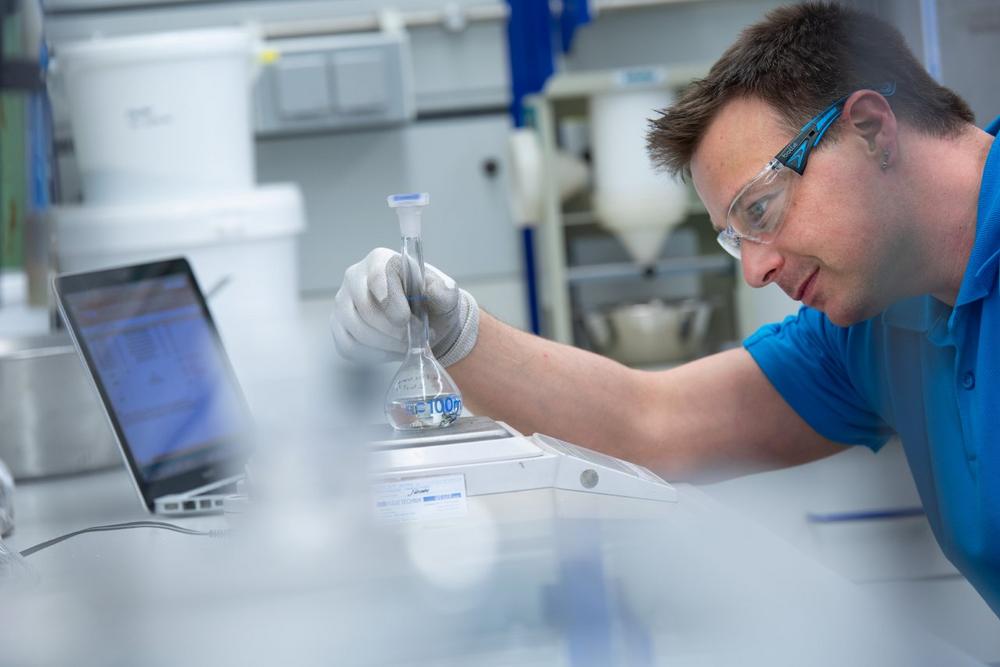– Until now, part of the slag produced during hot metal desulfurization has been disposed of in landfills.
– thyssenkrupp MillServices & Systems: Components can be extracted and reused across industries.
– Economic efficiency and CO2 reduction potential are being explored in a cross-industry partnership.
thyssenkrupp MillServices & Systems is pursuing a promising approach to reusing the slag produced in hot metal desulfurization and reducing the carbon footprint: Instead of disposing of the slag produced in desulfurization, its components are to be reused across all industries – as a building material, as fertilizer in agriculture and in steel production. The company launched a research project to this end on January 1, 2022, together with two Fraunhofer institutes, Weihenstephan-Triesdorf University of Applied Sciences, a cement manufacturer and a plant engineering company.
"We are pursuing a zero-waste approach: Our aim is to fully reuse the slag produced during hot metal desulfurization," explains Dr. Michael Dohlen, Head of Research and Development at thyssenkrupp MillServices & Systems, who is in charge of the project. The principle: Before the pig iron produced in the coke blast furnace is further processed in the steel mill, the sulfur content is reduced with the help of lime compounds. This produces hot metal desulfurization slag containing iron, calcium- and silicon-bearing minerals and sulfur. To date, partial quantities have been reused in iron production, while the majority is disposed of in increasingly scarce landfills.
Recycling of all components
thyssenkrupp MillServices & Systems wants to change that: With the help of electrodynamic fragmentation used at the Fraunhofer Institute for Building Physics IBP, all the iron is to be recovered from the slag and reused. The minerals containing lime and silicon will also be extracted. They are used in the cement industry, for example. The sulfur is made available to the fertilizer industry.
Of the estimated 450,000 tons of hot metal desulfurization slag produced in Germany each year, 200,000 tons could be reused in the iron and steel industry, 180,000 tons in the cement industry, and 22,000 tons in the fertilizer industry using this process. This creates a circular economy: Natural resources such as limestone and natural sand deposits are conserved, and carbon emissions are reduced in the participating industries.
The research project thus pays tribute to the sustainability strategy of thyssenkrupp Materials Services, the holding company of thyssenkrupp MillServices & Systems. The global materials distribution and service provider has set itself the goal of operating on a climate-neutral basis by 2030. In addition to the demands on its own organization, Materials Services is supporting this path of its customers with green products and sustainable supply chain solutions.
The research project
The joint project entitled "Reduced process emissions in steel and cement production – treatment and use of hot metal desulfurization slag" will run for four years and is funded by the BMBF (Federal Ministry of Education and Research in Germany) under the measure "Prevention of climate-relevant process emissions in industry (KlimPro-Industrie)".
thyssenkrupp MillServices & Systems is a leading provider of systematic industrial services. The industrial services are divided into five business areas. One of these is slag management. It includes liquid slag transport, processing, metal separation, slag marketing and research & development. The company belongs to Materials Services.
thyssenkrupp Materials Services is the biggest mill-independent materials distributor and service provider in the Western world with around 380 locations – including around 260 warehouse sites – in more than 30 countries. The versatile range of services offered by the materials experts allows customers to focus even more strongly on their individual core businesses. As part of its strategic further development "Materials as a Service" the company is focusing on the supply of raw materials and materials as well as products and services in the area of supply chain management. Digital solutions ensure efficient and resource-saving processes for customers and thus provide the basis for sustainable action. From 2030 Materials Services will operate on a climate-neutral basis.
thyssenkrupp Materials Services GmbH
thyssenkrupp Allee 1
45143 Essen
Telefon: +49 (201) 844-0
http://www.thyssenkrupp-materials-services.com/de
Head of External & Internal Communications
Telefon: +49 (201) 844-534416
E-Mail: lars.bank@thyssenkrupp-materials.com
Spokesperson
Telefon: +49 (201) 844-535721
E-Mail: katharina.nordmeyer@thyssenkrupp-materials.com
![]()
